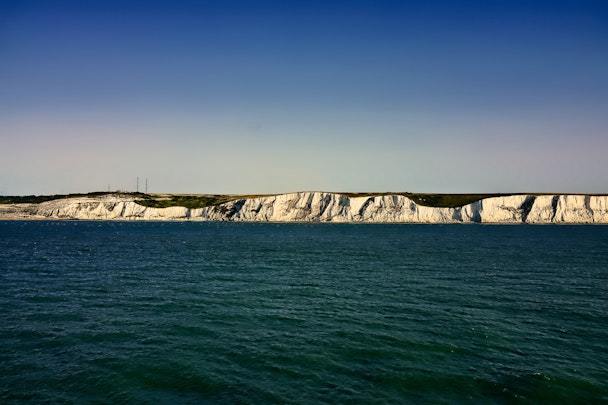Great ideas don’t get stuck at Dover, so UK agencies shouldn’t pause EU ambitions
Economic uncertainty and fraught political relations shouldn’t discourage UK agencies from attracting European clients, says Dafydd Prichard, director and co-founder of agency Cite – which just launched its own push into the northern European markets.

You shouldn’t let Brexit put a spanner in the works of your continental ambitions / Unsplash
The UK creative and marketing industries are extremely attractive to European businesses. Our reputation for attention-grabbing creativity, sophisticated brand communications and high-caliber talent precedes us.
It’s unsurprising therefore that the UK fares almost equally alongside the US for being top of the creative advertising leagues – and we have the added benefit of only one hour’s time difference.
This means exporting creative services internationally is a good option for many agencies. We work with a number of Nordic clients, specifically in the high-growth technology sector. Client feedback reinforces our belief that British agencies bridge a vital cultural gap for progressive European brands looking to take on the wider, English-speaking world.
There are a huge number of innovative companies within Europe, especially in the Nordic region (it’s really not that long ago that Nokia completely ruled the mobile roost). Today, many of these emerging brands are handsomely backed by large-scale investors and are keen to replicate the success of Silicon Valley.
Here in the UK, we have the fast-growth mindset that will get them there. We are assertive and can often push out to market quicker than our European counterparts, while also having a good understanding of the US market.
Political relations between the UK and our European counterparts may not be a bed of roses right now and, understandably, this is putting some of the industry off building European client relationships – but it shouldn’t.
Our specialist skills, knowledge and talent remain in great demand. We’re linked with 2,000 years of history. The UK’s languages, arts and sciences, political systems and even royal family are completely entwined with the wider European story. This long-term relationship outweighs short-term troubles, especially when creativity and results are delivered.
Exporting our creative minds, fortunately, is not significantly impacted by current European challenges. Our ideas aren’t queuing up at Dover waiting to board a ferry.
At Cite, we believe in our ‘integrated agency’ approach – we know a greater propensity of Nordic agencies specialize in particular disciplines. So even small clients are forced to engage a branding agency, a design agency and a performance agency (and then have the nightmare of cajoling them all to play nicely and work together).
We experienced genuine astonishment (and relief) recently when our client’s chief executive officer explained that having a single agency that could think strategically, design first-class experiences and manage integrated digital campaigns wasn’t something they had experienced, despite twenty years of service.
So much competition in the UK marketing industry has also driven innovation and put us ahead of Europe. The UK has rapidly adopted programmatic buying and has the largest online ad marketplace in Europe. We are also leaders on the continent for app development, virtual reality (VR) and artificial intelligence (AI), according to the CIC.
So, if you’re not deterred from expanding into the continent, how do you grow your European operations? We’re big advocates of exploring options with the UK government’s Department of International Trade (DIT), having worked with a governmental international trade adviser for the last seven years at Cite.
As part of our global growth plans, we were also recently able to utilize a new Internationalisation Fund, only formed last year by the DIT. With funding support, we were able to launch an overseas exhibition program to boost our presence in the Nordics, while lowering the financial risk to the business.
Managing monetary risk is key right now because, while we have the challenges already mentioned impacting European relations, there is a larger crisis potentially looming.
The risk of recession in Europe is growing, according to senior economists. Weaker outcomes are expected in 2023 than forecasted, with the true impact of Russia’s war in Ukraine and the EU’s ban on imports of Russian oil yet to be fully seen.
Six years after the Brexit referendum, however, Europe remains our biggest export market (let’s not forget that European culture forms the absolute bedrock of many aspects of British culture too). So, for this reason, it’s vital that we continue working together.
As with any situation, you have to weigh up the risk v benefit, and with the opportunities presented – and after first exporting our services into Europe in 2015 – it’s a rewarding market.
So, while the economic news regarding the Eurozone is a cause for concern, and something we will follow closely, it’s still not a region to be closed off to. The UK is in a strong position too. We have one of the top-performing ad sectors, with ad spend totaling £29.3bn last year according to Warc, and the industry is recovering well from the pandemic.
Ultimately, our creative thinking and sophisticated approach to brand strategy and marketing is one of – if not the – best in the world. The pervasive role the English language plays within the global business world gives us an incredible advantage. Combined with our sensitivity toward what it means to be European, we can perhaps think of ourselves as the world’s ‘creative diplomats.’
Dafydd Prichard is director and co-founder at Cite.